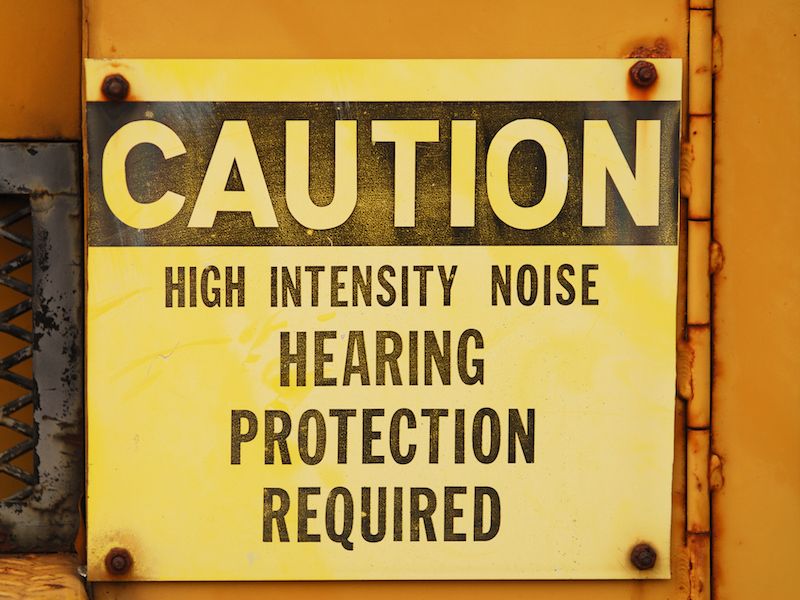
It’s one thing to realize that you should safeguard your hearing. Knowing when to safeguard your ears is another matter. It’s not as easy as, for example, knowing when to wear sunscreen. (Are you going outside? Is the sun out? You need to be using sunscreen.) Even knowing when you need eye protection is easier (Using a hammer? Cutting some wood or working with hazardous chemicals? Use eye protection).
When it comes to when to use hearing protection, there seems to be a large grey area which can be dangerous. Unless we have particular knowledge that some place or activity is dangerous we tend to take the easy road which is to avoid the issue entirely.
Risk Assessments
In general, we’re not very good at assessing risk, especially when it comes to something as intangible as permanent hearing problems or loss of hearing. Here are some examples to prove the point:
- Person A attends a very loud rock concert. The concert lasts approximately 3 hours.
- A landscaping business is run by person B. She spends a considerable amount of time mowing lawns, then goes home to a quiet house and reads a book.
- Person C works in an office.
You may think the hearing hazard is higher for person A (let’s just call her Ann). Ann leaves the show with ringing ears, and she’ll spend the majority of the next day, struggling to hear herself talk. It seems fair to presume that Ann’s recreation was quite risky.
Person B (let’s just call her Betty), on the other hand, is subjected to less noise. Her ears don’t ring. So it has to be safer for her hearing, right? Not necessarily. Because Betty is mowing all day. In reality, the damage accumulates a little bit at a time despite the fact that they don’t ring out. If experienced every day, even moderately loud noise can have a harmful affect on your ears.
What’s happening with person C (let’s call her Chris) is even more difficult to make sense of. The majority of people understand that you should protect your hearing while running machines such as a lawnmower. But while Chris works in a quiet office, she has a really noisy, hour-long commute each day on the train. What’s more, she sits at her desk and listens to music through earbuds. Is protection something she should consider?
When is it Time to be Concerned About Safeguarding Your Hearing?
In general, you should turn down the volume if you have to raise your voice to be heard. And if your environment is that noisy, you need to think about wearing earmuffs or earplugs.
So to put this a little more scientifically, you need to use 85dB as your limit. Sounds above 85dB have the ability, over time, to cause damage, so you should think about using hearing protection in those situations.
Your ears don’t have their own sound level meter to warn you when you reach that 85dB level, so most hearing specialists recommend getting specialized apps for your phone. You will be capable of taking the necessary steps to safeguard your ears because these apps will inform you when the sound is approaching a hazardous volume.
A Few Examples
Your phone might not be with you anywhere you go even if you do download the app. So we might develop a good baseline with a couple of examples of when to protect our ears. Here we go:
- Commuting and Driving: Do you drive for Lyft or Uber? Or perhaps you’re riding the subway after waiting for a while downtown. The noise of living in the city is bad enough for your hearing, not to mention the extra damage caused by cranking up your tunes to drown out the city noise.
- Exercise: You know your morning cycling class? Or perhaps your daily elliptical session. You may think about wearing hearing protection to each one. Those trainers who use microphones and sound systems (and loud music) to motivate you might be good for your heart rate, but all that loudness is bad for your ears.
- Every day Chores: We already mentioned how something as basic as mowing the lawn, when done frequently, can necessitate hearing protection. Cutting the grass is a good example of the sort of household job that could cause damage to your ears but that you most likely won’t think about all that often.
- Listening to music with earbuds. OK, this doesn’t require protection but does require care. Pay attention to how loud the music is, how long you’re playing it, and whether it’s playing directly into your ears. Noise-canceling headphones are a good choice to prevent having to turn the volume way up.
- Using Power Tools: You recognize that working every day at your factory job is going to necessitate hearing protection. But how about the hobbyist building in his workshop? Even if it’s just a hobby, hearing specialists suggest using hearing protection if you’re operating power equipment.
These examples may give you a good baseline. If there is any doubt, though, use protection. In the majority of cases, it’s better to over-protect your ears than to leave them subject to possible damage down the road. If you want to be able to hear tomorrow, protect today.
